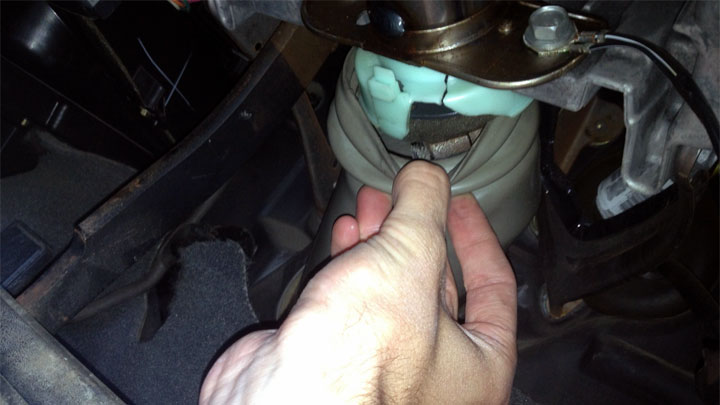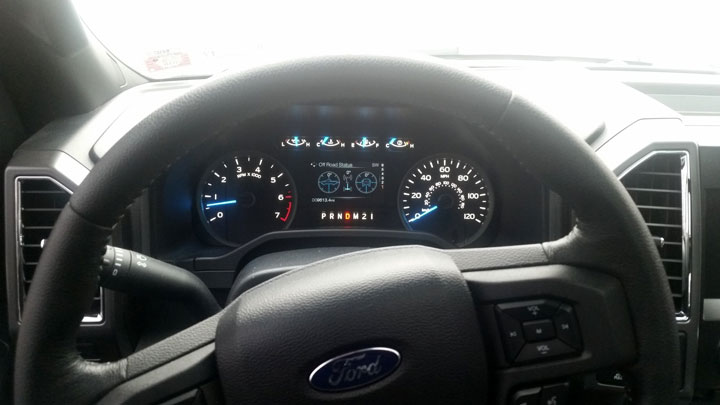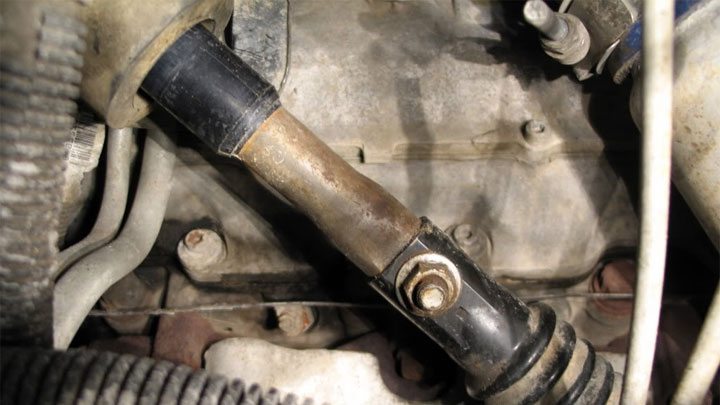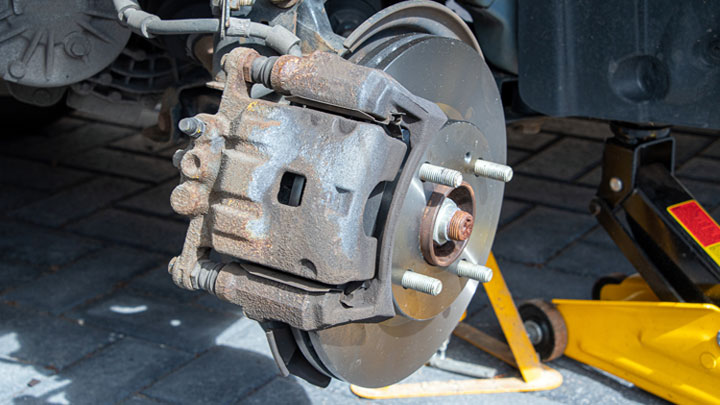Last Updated on October 26, 2021
The intermediate steering shaft is a crucial component of your vehicle. It’s the link between the gearbox and the steering wheel, making it the backbone of how you control your vehicle.
This shaft has two joints (one on each end) to support the angle between the shaft and the gear facilitating the smooth turning of the car’s wheels. This functionality means that when this vital component develops issues, driving your car could put you and your passengers at risk.
But how do you know that your steering shaft is malfunctioning? What are some common signs of a faulty intermediate steering shaft?
Keep reading to learn how this automotive component works, the common symptoms and causes of failure, and the cost of replacement.
How Does a Steering Shaft Work?
A steering shaft is a component of a car’s steering system that controls wheel movements.
It keeps the steering wheel and the rack connected in a rack and pinion steering system, steering box system, or power-assisted steering system. The shaft has universal joints on both tails, with one connecting to the steering wheel and the other to the steering box.
This way, it forms a ball system that recirculates and makes it easy to turn the wheels of a car.
Sometimes, your steering shaft may develop issues, and it’s vital to understand the symptoms early before the problem gets worse. Due to its hidden location, it might be hard for you to detect a problem, and tell-tale signs may be the only way to catch the malfunction.
Bad Intermediate Steering Shaft Symptoms
#1 – Turning Difficulties

If you experience difficulties when you turn the steering wheel, particularly as you navigate corners, you most probably have a malfunctioning steering shaft.
You may experience your steering wheel bind as you turn it, which may force you to apply more effort into turning the wheel. Besides being inconvenient and annoying, it’s also downright dangerous as your car could easily veer off the road, leading to an accident.
If you notice basic steering or turning difficulties, these are key symptoms that indicate a problem with your steering shaft. It’s essential that you get your car professionally checked out for a faulty steering shaft, especially if more than one symptom shows itself.
#2 – Strange Noises When on the Road

A strange sound emanating from your vehicle is another sign of a faulty steering shaft. Obviously, a noise can mean a hundred different things so you need to pay careful attention to the type and location of the noise.
Every car owner has a sense or ‘feel” for their car and can quickly notice if something’s gone wrong. A faulty steering shaft emits a popping or clunking noise that can begin as mild and eventually increase if left unchecked.
As the noise increases, the steering wheel becomes hard to control or turn. The cause of this sound is due to damage in the steering shaft, which can occur due to corrosion on the group of needle bearings.
Therefore, you’ll want to have a mechanic check out your steering shaft if you notice strange noises coming from the area while turning the steering wheel. It may simply need a bit of grease for lubrication but it may also be more serious and require replacement.
#3 – Loose Tilting of the Steering Wheel

Steering wheel tilt is a common feature in almost all modern vehicles. This feature allows you to tilt the steering to your preferred angle, enhancing your driving comfort and experience.
Once you achieve your desired angle, you should quickly lock it in to ensure that the steering remains in position.
If this action suddenly becomes difficult or even impossible, consider it another sign of a bad intermediate steering shaft and seek immediate help from your mechanic. Sure it may be an issue with the tilt feature itself but the shaft is often the culprit as well.
#4 – Needle Bearings Corrosion

The steering shaft features four needle bearings that are completely sealed. This normally allows them to not require regular greasing to prevent rusting, corrosion, and gliding.
But over time, the grease can begin to dry up, which can lead to moisture penetration that causes rusting and corrosion. When this happens, you’ll notice some strange noises, and a failure to address this issue can lead to steering shaft damage.
In case you catch this early on, you can resolve the issue by greasing the bearings manually but this is rarely possible due to most having a sealed system.
#5 – Irregular Steering Wheel Positioning

When on the road, your steering wheel should always be flexible and return to its initial position after you let go and drive forward. This is an essential feature for a safe steering system.
Whenever this is not the case and your steering wheel looks off kilter or a bit askew, you need to have your intermediate steering shaft assessed. Otherwise, it could be challenging to navigate on roads with turns, which in itself can be quite dangerous.
Common Cause of Failure
The most common cause of a bad steering shaft is a broken seal, which causes the grease on needle bearings to dry up. This condition allows moisture to penetrate the bearings causing corrosion and rusting.
As a result, the bearings fail to function, which in turn damages the steering shaft. You’ll then begin to notice some of the symptoms above.
Intermediate Steering Shaft Replacement Cost
Best places to order parts? See: 19 Best Online Auto Parts Stores

Replacement is the only solution for a faulty steering shaft in many cases. It may be frustrating knowing that a few small ball bearings within the system are causing the problem but they themselves are generally not replaceable and the entire shaft will need to be replaced instead.
Different car models come with different shafts; some vehicles have an integrated shaft while others have it as a separate part. Therefore, the replacement cost will largely depend on your car’s model.
However, in most passenger vehicles or street cars, the average cost of replacement ranges between $200 and $400. Parts alone make up $100 to $200 of that while labor cost makes up the rest.
It is essential to note that the cost of fixing your bad intermediate steering shaft symptoms can double if simply have a dealership do the job. Like most other replacements and repairs, we recommend that you find a good independent auto repair shop to fix the problem.
If you have moderate to advanced auto repair knowledge, you can often replace the shaft yourself (especially on older vehicles), but in most cases, this is a job that should be left for the pros.





When driving offroad the inside of the steering column sound like 2 peices of metal or steel tubes clanking together. The steering is great on turning. Tilt is fine. But that noise only happens when im offroad.
What type of terrain are you on? Are you rock crawling, or is it just some less maintained dirt roads like you see out in the forest?
I’m wondering if you’re hitting the front end on some rocks, and those vibrations are traveling up the steering column. It wouldn’t hurt to get it checked out to be safe, though.
I have a 2008 Chevy cobalt it recently has been having steering issues first it felt like almost a flat or dead spot when turning the steering wheel. I have the serpentine belt replaced which solved that issue and it steers much better now. My husband was driving it today and call and told me he was having a hard time steering. Luckily we live right next to a mechanic shop where he had turned in on the way home to see if someone had a few minutes to look at it. The mechanic turned the key off and on several times and it suddenly started steering normal again. It has been making some noises but it sound like it is coming from the wheel area( like a CVC joint) I have done some research on google and talked with my son who is a mechanic but lives far away and he also thinks it could be the intermediate steering shaft.
It could be. Have you verified that the tension is set correctly on the new serpentine belt? Too tight or too loose could cause issues for the pulley on the power steering pump.
When I go over bumps or on rough ground (field road) there’s a rattle/vibration in the steering wheel. It’s not quite as bad, but it’s almost like when you hit rumble strips. I was told its the intermidate shaft, but it seems like whatever it is is looser than those joints?
I wouldn’t mess around with that. You’ll want to figure out exactly what’s causing the issue before it gets worse. Could be something with the steering rack, tie rods, loose axle nut(s), or something else.
Hi, today Iam going to my Porsche dealer for a quality check for the Universal joint of the intermediate steering shaft on my 2021 Macan s car. After a year of ownership I have no steering issues or noises.Do you know of any reports of steering issues with this vehicle. Thank you